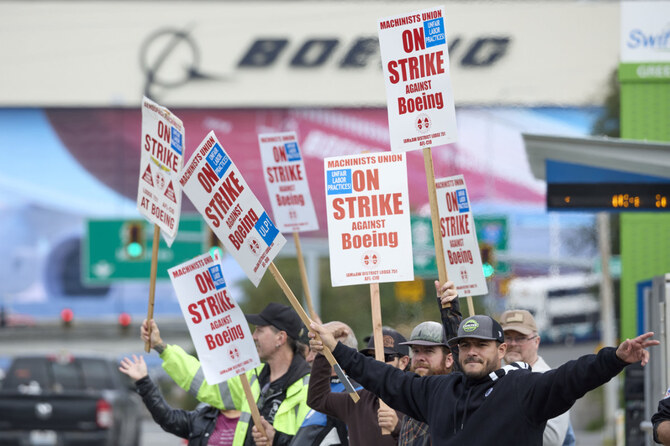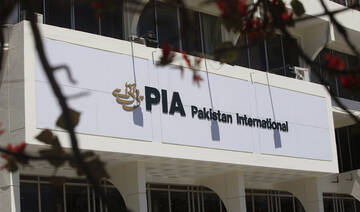SEATTLE, US: Blue-collar workers from Boeing walked picket lines in the Pacific Northwest instead of building airplanes on Friday after they overwhelmingly rejected a proposed contract that would have raised their wages by 25 percent over four years.
The strike by 33,000 machinists will not disrupt airline flights anytime soon, but it is expected to shut down production of Boeing’s best-selling jetliners, marking yet another setback for a company already dealing with billions of dollars in financial losses and a damaged reputation.
The company said it was taking steps to conserve cash while its CEO looks for ways to come up with a contract that the unionized factory workers will accept.
Late Friday, the Federal Mediation and Conciliation Service said it would convene new talks early next week.
“FMCS has been in contact with both IAM and Boeing to support their return to the negotiation table and commends the parties on their willingness to meet and work toward a mutually acceptable resolution,” the agency said in a statement.
Boeing stock fell 3.7 percent Friday, bringing its decline for the year to nearly 40 percent.
The strike started soon after a regional branch of the International Association of Machinists and Aerospace Workers reported that in a Thursday vote, 94.6 percent of participating members rejected a contract offer that the union’s own bargaining committee had endorsed, and 96 percent voted to strike.
Shortly after midnight, striking workers stood outside the Boeing factory in Renton, Washington, with signs reading, “Have you seen the damn housing prices?” Car horns honked and a boom box played songs including Twisted Sister’s “We’re Not Gonna Take It” and Taylor Swift’s “Look What You Made Me Do.”
Many of the workers who spoke to reporters said they considered the wage offer inadequate given how much the cost of living has increase in the Pacific Northwest. John Olson said his pay had increased just 2 percent during his six years at Boeing.
“The last contract we negotiated was 16 years ago, and the company is basing the wage increases off of wages from 16 years ago,” the 45-year-old toolmaker said. “They don’t even keep up with the cost of inflation.”
Others said they were unhappy about the company’s decision to change the criteria used to calculate annual bonuses.
The machinists make $75,608 per year on average, not counting overtime, and that would have risen to $106,350 by the end of the proposed four-year contract, according to Boeing.
Under the rejected contract, workers would have received $3,000 lump sum payments and a reduced share of health care costs in addition to pay raises. Boeing also met a key union demand by promising to build its next new plane in Washington state.
However, the offer fell short of the union’s initial demand for pay raises of 40 percent over three years. The union also wanted to restore traditional pensions that were axed a decade ago but settled for an increase in new Boeing contributions to employee 401(k) retirement accounts of up to $4,160 per worker.
The head of the union local, IAM District 751 President Jon Holden, said the union would survey members to find out which issues they want to stress when negotiations resume. Boeing responded to the strike announcement by saying it was “ready to get back to the table to reach a new agreement.”
“The message was clear that the tentative agreement we reached with IAM leadership was not acceptable to the members. We remain committed to resetting our relationship with our employees and the union,” the company said in a statement.
Boeing Chief Financial Officer Brian West, speaking Friday at an investor conference in California, said the company was disappointed that it had a deal with union leadership, only to see it rejected by rank-and-file workers.
During the strike, Boeing will lose an important source of cash: Airlines pay most of the purchase price when they take delivery of a new plane. West said Boeing — which has about $60 billion in total debt — is now looking at ways to conserve cash. He declined to estimate the financial impact of the strike, saying it would depend on how long the walkout lasts.
Before the strike, new CEO Kelly Ortberg gathered feedback from workers during visits to factory floors, and he “is already at work to get an agreement that meets and addresses their concerns,” West said.
White House press secretary Karine Jean-Pierre said Biden administration officials have contacted Boeing and the union.
“We believe that they need to negotiate in good faith and work toward an agreement that gives employees benefits that they deserve. It would make the company stronger as well,” she said.
Very little has gone right for Boeing this year, from a panel blowing out and leaving a gaping hole in one of its passenger jets in January to NASA leaving two astronauts in space rather sending them home on a problem-plagued Boeing spacecraft.
The striking machinists assemble the 737 Max, Boeing’s best-selling airliner, along with the 777 jet and the 767 cargo plane. The walkout likely will not stop production of Boeing 787 Dreamliners, which are built by nonunion workers in South Carolina.
The strike is another challenge for Ortberg, who just six weeks ago was given the job of turning around a company that has lost more than $25 billion in the last six years and fallen behind European rival Airbus.
Ortberg made a last-ditch effort to salvage a deal that had unanimous backing from the union’s negotiators. He told machinists Wednesday that “no one wins” in a walkout and a strike would put Boeing’s recovery in jeopardy and raise more doubt about the company in the eyes of its airline customers.
“For Boeing, it is no secret that our business is in a difficult period, in part due to our own mistakes in the past,” he said. “Working together, I know that we can get back on track, but a strike would put our shared recovery in jeopardy, further eroding trust with our customers and hurting our ability to determine our future together.”
Ortberg faced a difficult position, according to union leader Holden, because machinists were bitter about stagnant wages and concessions they have made since 2008 on pensions and health care to prevent the company from moving jobs elsewhere.
“This is about respect, this is about the past, and this is about fighting for our future,” Holden said in announcing the strike.
The suspension of airplane production could prove costly for beleaguered Boeing, depending on how long it runs. The last Boeing strike, in 2008, lasted eight weeks and cost the company about $100 million daily in deferred revenue. A 1995 strike lasted 10 weeks.
Before the tentative agreement was announced Sunday, Jefferies aerospace analyst Sheila Kahyaoglu estimated a strike would cost the company about $3 billion based on the 2008 strike plus inflation and current airplane-production rates.
A.J. Jones, a quality inspector who has been at Boeing for 10 years, was among the workers picketing on a corner near Boeing’s Renton campus. He said he was glad union members had decided to hold out for more pay.
“I’m not sure how long this strike is going to take, but however long it takes, we will be here until we get a better deal,” Jones said.

















